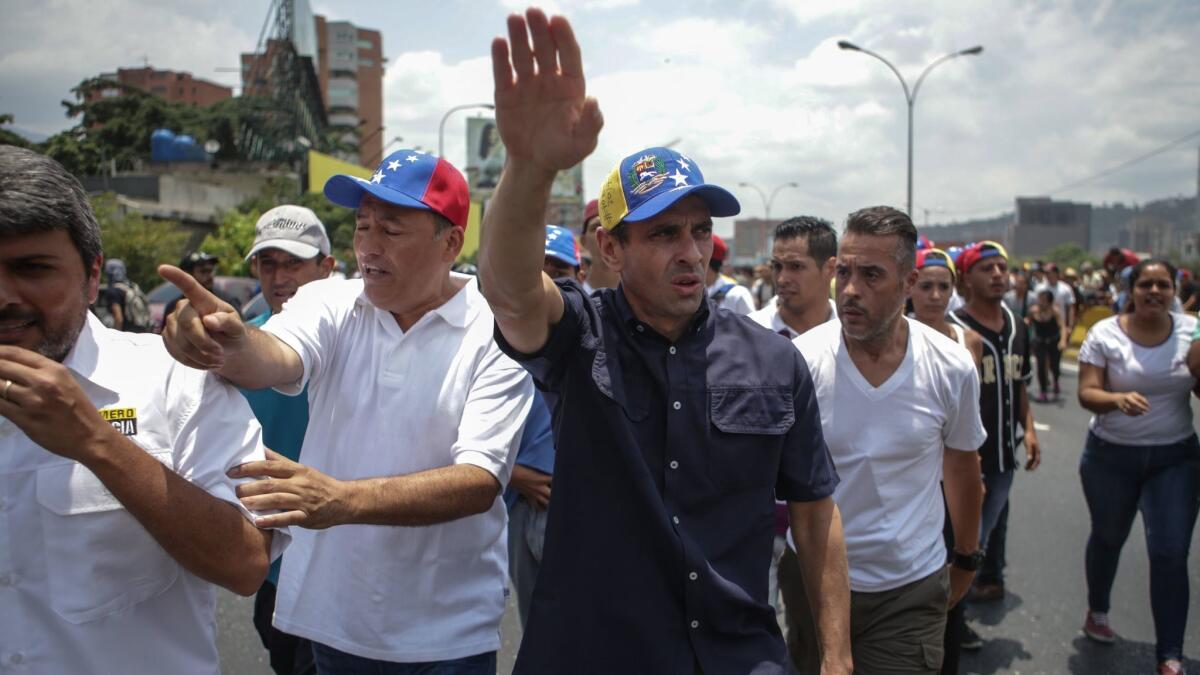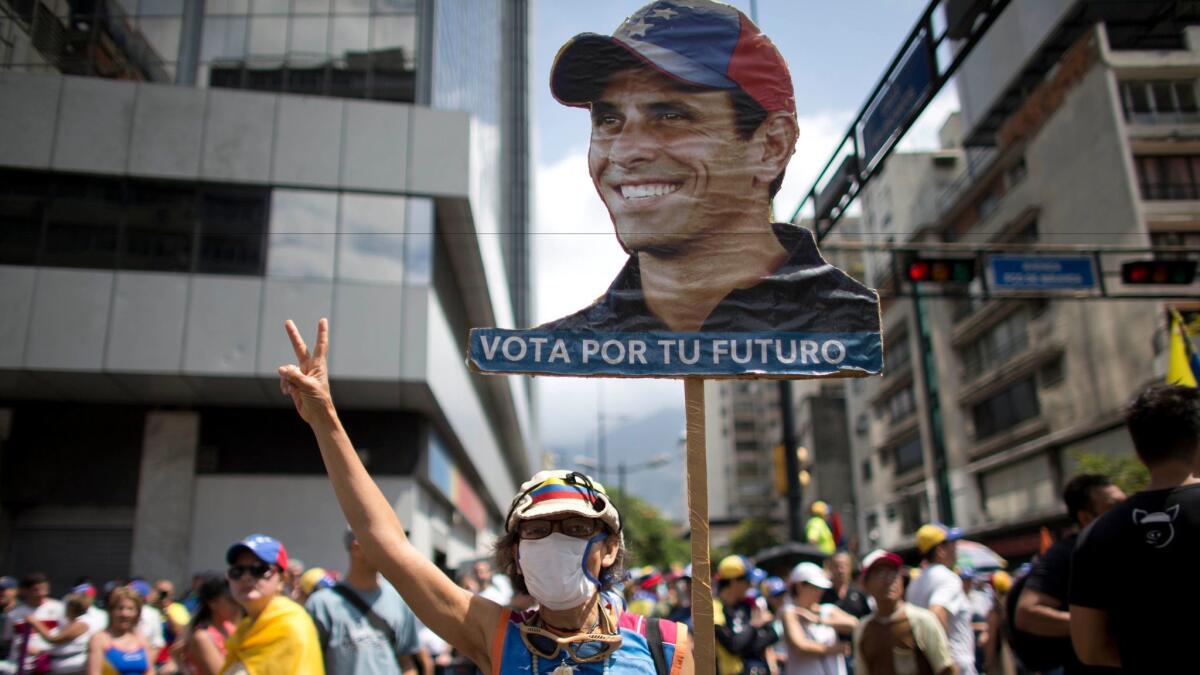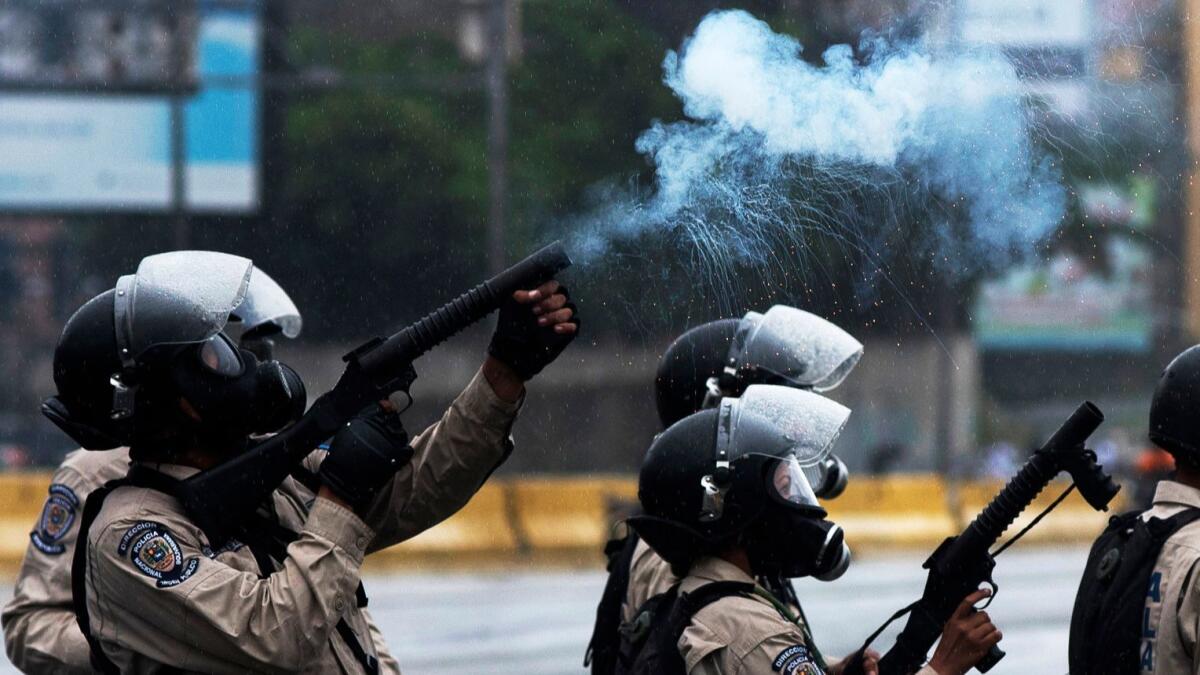Meet the charismatic opposition leader the Venezuela government just can’t silence

Reporting from CARACAS, Venezuela — Venezuelan opposition leader Henrique Capriles has taken the gloves off.
The 44-year-old governor of Miranda state kept to the high road during most of his political career, including his two unsuccessful tries for president, losing first to the late Hugo Chavez in 2012, and then in a photo-finish loss to current President Nicolas Maduro in the 2013 contest to be Chavez’s successor.
In both presidential races, he refused to respond in kind to nonstop, scurrilous insults lobbed his way by Chavez, Maduro and their supporters. Many of the jibes can’t be repeated in a family newspaper but nonetheless were broadcast over government-controlled news media.
“Those who make insults pay a price…. People who don’t measure their words suffer the consequences,” Capriles said in an interview prior to the October 2012 election against Chavez. “Venezuelans are tired of the politics of insults and recriminations.”
But in recent days, as once-prosperous Venezuela descends deeper into chaos — with mass protests against food scarcities, rising crime and Maduro’s autocratic style — Capriles has adopted a more radical stance.
In a flurry of messages sent out over his social media account over the last week, Capriles accused Maduro and his officials of being “corrupt narcos,” of “overthrowing democracy,” of promoting riots and encouraging looting in his state’s capital, Los Teques.

Capriles also said Maduro is “abhorred” by Venezuelans for what he described as “paramilitary” assaults on peaceful protesters. In a Tuesday tweet, he seemed to encourage police, the national guard and soldiers to mutiny and resist the government’s orders to restrain protesters.
What has changed? On April 7, the nation’s comptroller general disqualified Capriles from running for any public office until 2032, alleging, without offering proof, that he misused public funds as governor. Capriles denies the charges, saying furthermore that his disqualification goes against laws that say only the Supreme Court can make such a judgment against a sitting governor.
Given widespread discontent with the Maduro regime, Capriles stood a good chance in next year’s presidential election of beating Maduro or whoever the nominee might be of the United Socialist Party of Venezuela, which was founded by Chavez and is now headed by Maduro, a former bus driver.
Capriles created a sensation in 1997 when he was elected to the National Assembly at age 25. Two years later in 1999, he became Venezuela’s equivalent of House speaker. A year after that, he left congress to run successfully for mayor of Caracas’ wealthy Baruta borough, winning 63% of votes cast.
His ascent continued in 2008, when he won the governorship of Miranda state by outpolling Chavez’ handpicked candidate, Diosdado Cabello. Capriles has earned a reputation as an effective politician who has delivered to his constituents as assemblyman, mayor and governor.
Charismatic and athletic, Capriles is a marathon runner and physical fitness buff. During his 2012 presidential campaign he interrupted his campaign on Margarita Island to play 10 minutes of fast-paced, full-court basketball with youths, displaying an effective one-handed jump shot.
NEWSLETTER: Get the day’s top headlines from Times Editor Davan Maharaj »
What his detractors would describe as the biggest stain on his career came during the short-lived 2002 coup against Chavez, who was removed from power by dissident army officers and right-wing business leaders for several days before being restored to office.
During that time, the Cuban Embassy, which was located in Capriles’ Baruta borough, was attacked and vandalized. The Cuban ambassador was blocked from leaving. Chavez arrested Capriles in connection with the attacks, even though Capriles claimed to have entered the embassy to protect the Cuban ambassador, an account confirmed by the ambassador himself. Capriles spent four months in jail awaiting a trial that never took place.
Despite the repeatedly attempts to silence him, Capriles continues to speak out — now more forcefully than in the past.
Venezuelan analyst Alfredo Maza took note of Capriles’ change of tone in a column written for the Spanish newspaper El Pais, saying he has “returned to the street and is using unheard of terms in his discourse.”
“He calls the regime a dictatorship. In moments of high emotion, he calls it a narco-dictatorship,” Maza wrote. “The intelligence of Capriles has been to wait for just the right moment to put himself in front of the opposition.”
On Friday, the U.S. State Department joined a host of domestic and international critics in condemning the disqualification of Capriles, “the most viable opposition challenger to Maduro … as a means of keeping him out of elections.”
Capriles’ disqualification, combined with public reaction to the Supreme Court’s decision in late March to shift powers of the National Assembly to Maduro, set off massive protest marches across Venezuela. Clashes between marchers and government forces using tear gas and rubber bullets left at least six dead and 200 injured. An unknown number of people were arrested. Throughout the week, Capriles led street protests and on at least one occasion was overcome by tear gas.

(The court, which is aligned with Maduro, quickly backed down and reversed itself April 1 and the National Assembly retains its powers.)
For many supporters, Capriles’ more aggressive stance is a welcome change from the past when, in the eyes of some activists, he was too passive, particularly in comparison with Leopoldo Lopez, another former Caracas borough mayor who in 2014 led nationwide demonstrations demanding Maduro resign.
Those 2014 marches led to violent clashes that left 46 dead and hundreds injured. Lopez was arrested on what supporters say were spurious incitement to violence charges and has spent the last three years in jail, despite demands by human rights groups that he be released.
Capriles at the time said he disagreed with Lopez’s strategy of trying to force Maduro from office via nationwide demonstrations because it was doomed to failure. “I want to avoid causing frustration for our people when I see that there are [goals] that can’t be obtained,” Capriles told a local reporter.
His refusal to join Lopez also marked a split with Maria Corina Machado, a former National Assembly member and opposition leader, who also took to the streets to demand Maduro leave office. She since has been barred from running for office as well.
But Capriles, who is an attorney by education, seems to have become more hard line in recent days. In tweets he has hinted that rioting and looting in his state have been staged by pro-Maduro forces to distract public attention from opposition protests.
Special correspondents Kraul and Mogollon reported from Bogota, Colombia, and Caracas, Venezuela, respectively.
ALSO
Another journalist is gunned down in Mexico — the fourth in just six weeks
In Venezuela power play, another opposition leader is sidelined by dubious accusations
More to Read
Sign up for Essential California
The most important California stories and recommendations in your inbox every morning.
You may occasionally receive promotional content from the Los Angeles Times.









